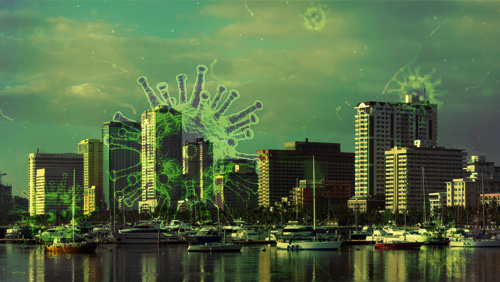As increasing measures are enacted to contain the COVID-19 coronavirus epidemic, the gambling sector in the Philippines faces a lot of uncertainty. The Philippines Amusement and Gaming Corporation (PAGCOR) has ordered casinos to cease operations for at least the next month. And now after President Rodrigo Duterte ordered strict home quarantine, a transportation ban, and closure of most businesses, Philippine Offshore Gambling Operators (POGOs) have to navigate a tricky path to stay operational. We spoke with several employees in the POGO industry to see what their arrangements are for the quarantine.
 As someone stuck in the middle of this home quarantine situation myself, I can tell you it’s a bizarre experience. Manila, where there’s always the sounds of car horns and loud people, is quiet and eerily vacant. Nobody is leaving their home, for fear of either catching the virus, or running afoul of the authorities.
As someone stuck in the middle of this home quarantine situation myself, I can tell you it’s a bizarre experience. Manila, where there’s always the sounds of car horns and loud people, is quiet and eerily vacant. Nobody is leaving their home, for fear of either catching the virus, or running afoul of the authorities.
As part of the escalated quarantine, there is zero public transit, and for most people, the only methods of getting anywhere are either walking, or illegally hitchhiking. My mother-in-law had to walk 14 blocks to visit our apartment tonight, and let me tell you, nobody’s happy about that.
POGOs have not been ordered to close, putting them in a sticky situation. How do they keep operations running if employees can’t get to work, or landlords have shuttered their buildings?
One source we spoke with proudly told us that a week ago, well before the quarantine began, their operation had fully shifted to employees working from home. Everything is business as usual, but nobody is at the office. This source worked for a POGO with approximately 100 employees.
Another source told us their POGO has transitioned to a skeleton staff working from home. Their office space had been closed, leaving the operation no choice but to find an alternative. This smaller operation chose key staff and agents to provide mobile WIFI devices to. For the rest of their staff, employees will have to use their vacation and sick leaves, and hope the office can re-open before those run out.
Another employee told us their operation has been as much as possible to reduce the burden on staff since this whole mess began. When the situation got grave and a lockdown was ordered, “They provided free meals, even transport,” they told us. Now that the home quarantine has been ordered, employees are using Virtual Private Networks (VPN) to login from home.
These all seem like solid solutions, if not ideal, to keep a POGO running. But not every operation had the luxury of letting employees work from home, or providing transportation.
The last source we spoke with described an operation desperately looking for a solution as the situation evolved. Until the stricter quarantine was ordered, employees were encouraged to use Grab, a local equivalent to Uber, and get reimbursed for the cost. Now that Grab has been ordered to suspend operations and there’s no public transportation whatsoever, a couple of options have been proposed.
The company has proposed setting up satellite offices at hotels and Airbnbs. If employees opted to work there, they would be confined to the hotel space for the duration of the quarantine, currently expected to end sometime in mid-April. Senior staff will be working from home, but agents will be expected to work in a scenario not that different from a Big Brother show. If agents don’t agree, they won’t be paid until the office re-opens and they return to work.
That leaves employees the impossible choice between their careers and those who might need the most help. “I want to work, but I cannot leave my parents who are already in their late 70s,” our source said.
That seems to be the shape of this epidemic. As the situation gets worse, gambling businesses who came into this healthy and well prepared are finding ways to continue on. Meanwhile, plenty of operations, either because of a lack of means, plenty of debt, or a want of planning, are now scrambling to survive, and may not see the end of it.





